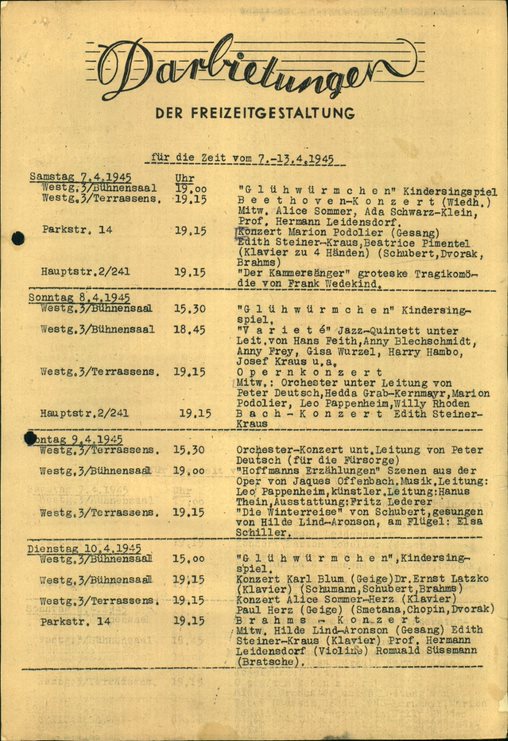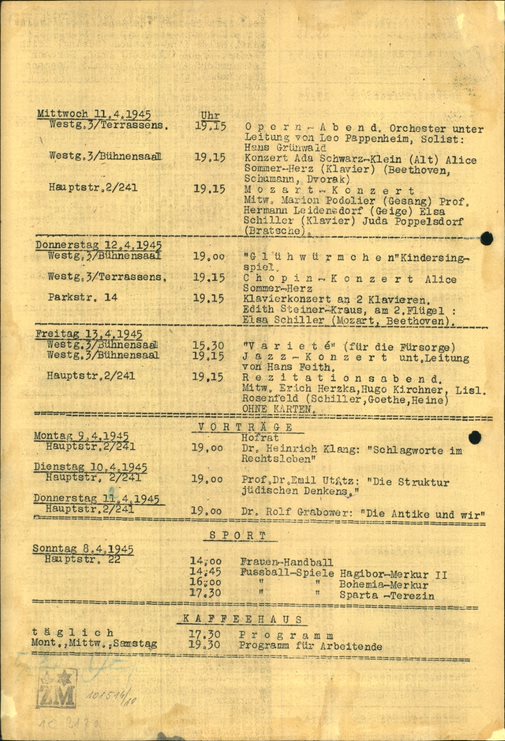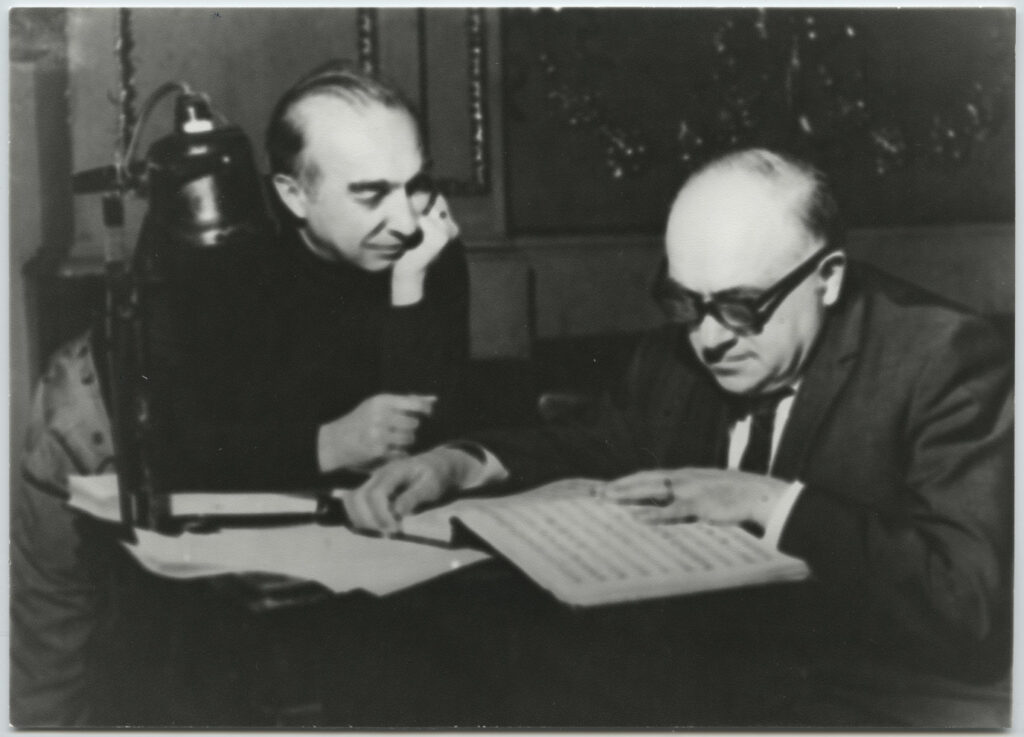As many as 1,057 prisoners arrived in the Terezín Ghetto in a transport codenamed AE 1 (Arbeitseinsatztransporte) on January 31, 1945. These were Jewish partners from what were called mixed marriages (one of the couple was classified as a Jew according to would-be legislative norms, the Nuremberg Laws). Hanuš Thein, a man of the theater, was among them.
Hanuš was born on January 17, 1904 in Pardubice, in the family of physician Lev Thein who figured among the leading lights of the Czech-Jewish movement. That had a strong background in Pardubice. Hanuš´s father published articles in the magazine Rozvoj (Development) issued by Dr. Viktor Vohryzek. Apart from writing magazine articles Lev Thein also devoted himself to amateur theater and recitation.
In keeping with the family traditions Hanuš was expected to study law like his uncle. Hanuš really enrolled in the Law Faculty but he also began studies at the opera department of the State of Conservatoire of Music in Prague. He was admitted after one of the teachers at the conservatoire, Egon Fuchs, had heard Hanuš sing, while visiting Thein´s aunt. Fuchs then recommended to Hanuš´s father to let the boy study singing and then continue his musical education at the conservatoire.
In 1926, Thein as a spectator in the National Theater witnessed nationalistic obstructions and protests during the second rerun of Alban Berg´s avant-garde opera Wozzeck. In the following year, Thein joined the National Theater as a bass singer (he did not finish his law studies because of the new job). His biggest role in the theater was the part of Kecal (a village matchmaker) from Smetana´s opera The Bartered Bride (during his whole career he was cast in this role 238 times), followed by Bartolo from Rossini´s The Barber of Seville, Lucifer in Dvořák´s opera The Devil and Kate, Bartolo in Mozart´s The Marriage of Figaro and finally the role of the burgrave in Dvořák´s The Jacobin.


Starting in 1932, he worked in the National Theatre also as an opera director. The first opera Thein directed was Engelbert Humperdinck´s Hänsel and Gretel. Its première took place in December of that year. Before World War II he rehearsed Rossini´s The Barber of Seville, Dvořák´s The Water Nymph, Wagner´s The Flying Dutchman, Smetana´s The Bartered Bride and Tchaikovsky´s Eugene Onegin. In his pioneering spirit he also staged new works, such as e.g. Johnny´s Kingdom or The Bud composed by the then head of the National Theater opera company Otakar Ostrčil or Jaroslav Křička´s opera Ghost in the Castle. In staging the latter opera, Thein cooperated with stage designer František Zelenka who was later also imprisoned in the Terezín Ghetto but did not survive the war.
During the Second Czechoslovak Republic the mounting anti-Semitic sentiments and disturbances also affected Hanuš Thein´s life. At that time he directed The Bartered Bride for the second time and Dr. Stanislav Mojžíš-Lom, the director of administration at the National Theater, decided to leave out Thein´s name as the opera director on the relevant theater announcement. The director also forbade him to appear on the stage to thank the audience for their applause after the première on October 13, 1938. After that Thein managed to rehearse Gounod´s opera Faust and Marguerite and his last work in the National Theater – before his forced almost seven-year long break – was the performance of Manon by Jules Massenet.
Following March 15, 1939 (the German invasion of the rest of the former Czechoslovakia) he was employed first as a farm hand, later as a logger in the Zbečno forests. During that time he helped to establish an amateur opera ensemble in Rakovník.
During his imprisonment in the Terezín Ghetto Thein was involved in various cultural events held in the local gym, particularly on the occasion of the second visit to Terezín by a delegation of the International Committee of the Red Cross on April 6, 1945. From March 1945 on, he participated as a director in rehearsing the opera Broučci, cooperating with Vlasta Schönová who was in charge of selecting child actors and co-directing. The performance was conducted by Robert Brock.
Furthermore, Thein rehearsed, at the order of the Nazi camp command, a shortened version of The Tales of Hoffmann by Jacques Offenbach from a score that had been brought from the National Theater. The score had been used earlier by director Ferdinand Pujman for staging a performance of the opera in which Thein sang the role of Luther. After the end of the war, Thein told Václav Podrábský, the keeper of the archives in the National Theater, where to find the score for the opera, hidden in the former Ghetto. The latter went to Terezín and salvaged the sheet music for the opera.
According to Thein´s recollections, the top-ranking Nazi officer Hans Günther wanted Thein to play him the overture to Offenbach´s Orpheus in the Underworld. Since there were no notes available in the Ghetto, the overture could not be performed. Instead, an improvised orchestra made up of about twenty musicians, gave a private performance of Dvořák´s Serenade in E flat major.

After the war Thein returned to the National Theater, his first postwar staging being Vítězslav Novák´s opera Lantern (premièred on October 16, 1945). He kept staging a great number of works of the classical repertoire (e.g. Dvořák´s operas The Devil and Kate, The Cunning Peasant or The Jacobin, Smetana´s The Secret, Tchaikovsky´s Queen of Spades as well as his lesser known Cherevichki, Verdi´s Othello, Janáček´s Káťa Kabanova and The Excursions of Mr. Brouček), just as new operas. Out of these, let us mention the antifascist opera Lake Ukerewe by Otmar Mácha based on Vladislav Vančura´s story (May 1966) and J. F. Fischer´s Romeo, Juliet and Darkness according to Jan Otčenášek´s novella whose subject was particularly close to Thein´s heart. It tells the wartime story of love between a Jewish girl hiding from the Nazis and a boy who´s hiding her. In his book of memoires I Lived with the National Theater Opera Thein wrote about this particular work: “Fischer´s opera Romeo, Juliet and Darkness stirred my heart strings immediately and that´s why I was so happy when I was given the task to direct it. I was touched by its subject in the first place. I could never understand why the whole world was keeping silent, why it was just shaking its head, why members of all cultural nations had their ears stopped and did not hear or did not want to hear that blood-curdling, ghastly weeping and wailing of the victims – men, women and children – who were being murdered, tortured and battered to death according to the Nazi diabolical plan just because they had been born to parents of Jewish descent. When the young, charming Ester – Juliet from Fischer´s opera – appears on the stage with a degrading yellow star on the left side of her chest, on the spot of her heart, frightened, carrying a small suitcase, knackered, condemned to leave in a transport, hence condemned to death, how could this image fail to trigger the memories of thousands of known or similar Juliets? ” The opera had its première in October 1962 and its closing night in June 1965; in all, opera fans could see fifteen performances of this work.
In addition to his work in the National Theater Thein also appeared as a guest director in Ostrava, Olomouc, Brno, Liberec, Pilsen, London, but also in Plauen in what was then the German Democratic Republic, and in the Dutch National Opera. As a popular bass singer he performed in TV opera stagings during the 1950s and 60s (Puccini´s La Boheme, The Marriage by B. Martinů, Janáček´s The Makropoulos Case, Prince Igor by Alexander Borodin), but also in Nedbal´s operetta Polish Blood. The last opera Thein directed was Janáček´s Její pastorkyňa premièred in the National Theater on May 30, 1969. In the years 1950–1974 Thein also worked as a professor of opera singing and directing at the Prague Conservatoire.
Hanuš Thein died on December 30, 1974 and is buried in Prague´s Vyšehrad Cemetery just as many of his colleagues from the National Theater.
Pavel Straka


